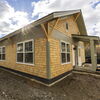Panel focuses on elder care; Eastern Maine Healthcare, Mercy expand
Looking to mimic the state of Vermont, which saved $13 million on long-term care in the last couple years, speakers at a round-table series in Augusta discussed ways Maine could improve elder care, reduce costs and create more livable communities for people of all ages.
Vermont’s savings came mainly from spending more on home-care services and group homes that can keep seniors in their communities, a Portland Press Herald article said.
And more than half of that money saved is to be reinvested to expand independent living options for seniors, Dr. Susan Wehry, Vermont’s commissioner of disabilities, aging and independent living, told the meeting.
The Maine panel was hosted by House Speaker Mark Eves (D-North Berwick) and sponsored by the Maine Council on Aging.
She added that Vermont’s efforts in rural communities are examples at a time when the federal government and many states are looking for better, less expensive ways to offer long-term care.
Maine’s median age of 43.5 years is the highest in the United States, according to the U.S. Census. New Hampshire and Vermont rank second and third. And Maine’s proportion of people age 65 and older, some 17%, is second only to Florida’s 18.2%.
Maine also has the country’s highest proportion of baby boomers, 29% of its 1.3 million residents, and they are turning 65 at a rate of 18,250 a year, the paper said, quoting information from AARP Maine.
When it comes to long-term care, the Press Herald said Maine has not followed Vermont’s lead in shifting costs to less expensive in-home and group-home care. The inflation-adjusted cost of MaineCare-funded, long-term care services rose 33% in the last decade to $354 million in 2010, according to the University of Southern Maine’s Muskie School of Public Service.
During that time, nursing home expenses increased 27% to $236 million and state-funded, assisted-living costs rose 116% to $69 million.
In a separate development yesterday, Mercy Health System of Maine and Eastern Maine Healthcare Systems received certificate-of-need approval to make Mercy and VNA Home Health Hospice the newest members of EMHS, according to a press release.
In July, the Vatican approved the merger between Eastern Maine and Mercy, which operates a Portland hospital affiliated with the Roman Catholic Church.
As a member of EMHS, Mercy Health will be able to continue to deliver care in the Portland area as part of an extensive Maine-based healthcare system. And EMHS will benefit from Mercy’s development of an ambulatory network and VNA’s extensive home-based care systems.














Comments